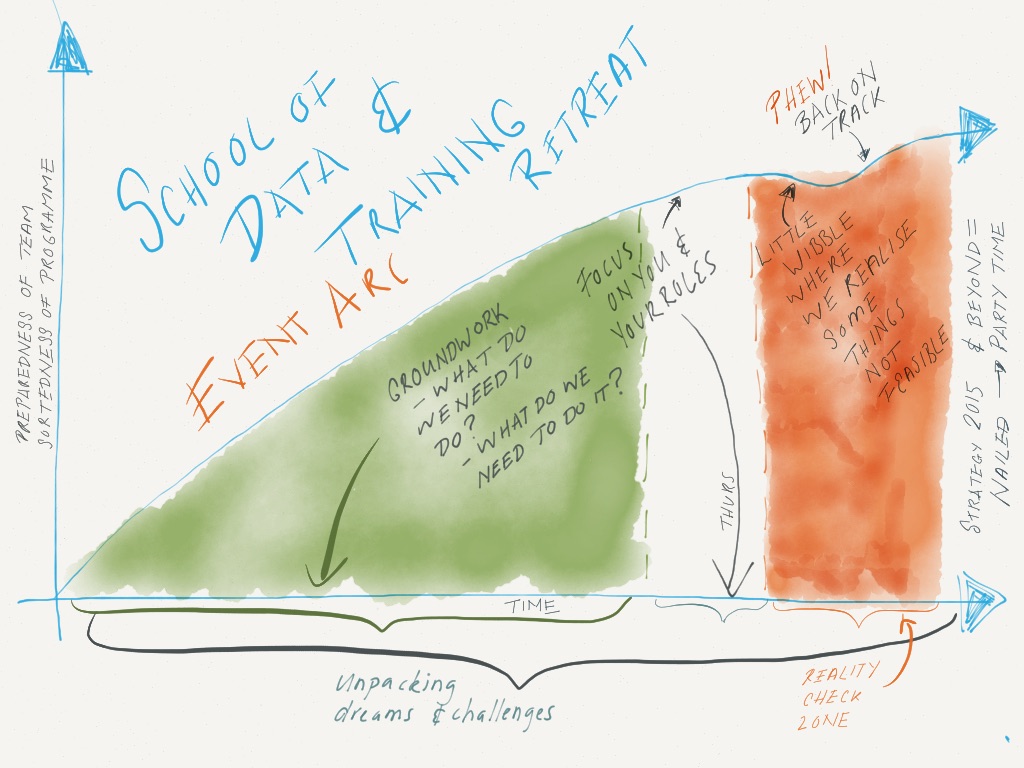
My first strategy retreat - a template
My first strategy retreat with School of Data
I recently got the opportunity to facilitate my first week-long strategy retreat for School of Data. It appears to have gone very well, thanks in large part to a bit of help from my good friend and facilitation guru, Dirk Slater.
Dirk encouraged me to share the template as many activities seem quite applicable to other scenarios - so here it is!
Preparation: Communicate the arc and how everything will fit together and build on each other

Cheers again to Dirk for impressing on me the importance of having a narrative flow.
Energy and patience is often highest at the beginning of events like this, when people are given the opportunity to let their creativity flow. When reality checks set in later in the week however, wnergy can drop. I was keento manage people’s expectations for when the speedbumps came. The diagram above is what I came up with and it appeared to work pretty well to set the tone and help people bounce back, even when ideas they were attached to seemed unfeasible!
The basic flow of the days were:
- Day 1: Dreaming big & lookback over the past year - (Activities List)
- Day 2: Goals & resources - what do we need to acheive what we set out to do? -(Activities List)
- Day 3: Forward looking - revising the strategy for the year ahead - (Activities List)
- Day 4: Personal development day - chance for 1:1 chats with line managers and HR team (Activities List)
- Day 5: Reality and quality check day - is what we planned realistic? How do we improve the quality of our plans? (Activities List)
I will not unpack all of the activities, as some of them will not be useful to anyone else, but below I will link the best of them and list my lessons learned.
Lessons learned
I’d like to share a couple of key takeaways and words of wisdom which I took from Dirk about the role of a facilitator at an event such as this:
- “Don’t allow people to dwell in the negative space”. This is particularly relevant when running retrospectives. People may need an opportunity to bitch sometimes to get something off their chest - but retrospectives are not blame games. It is useful to frame discussions in a way that gives them a mechanism to be constructive “what can I change?”, “what can I not change?”. Ultimately - you want people realise that they can be part of the solution- it makes everyone feel more positive and shares the workload!
- Get people outside of their own space / Have an ego parking lot. Related to the above - people have a tendency to dwell on their particular pet thoughts. It was important to frame everything as: “how will this contribute to making the programme better?”. Keep that thought front and centre.
- “At what point in the agenda are you going to talk about users?” - make sure you build in regular reality checks that involve thinking about how real people would use your stuff …
- It’s a facilitator’s job to keep things positive. I initiatially found questions such as: “what were the moments in the last year made you proudest?” (see Day 1 for examples of where we used these) and “what do you appreciate about being part of this team?” a bit sacrine, but it is surprising how well they set the tone for what could be some hard retrospective questions.
